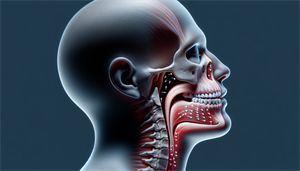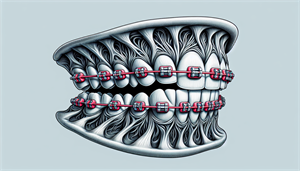Struggling with an overbite and nightly snoring? Understanding the connection between overbite snoring and disrupted sleep is critical. This concise guide addresses your main concerns directly: Can an overbite cause snoring, and what can you do about it?
Discover key signs, health implications, and the best ways to treat overbite snoring, paving the way to restful nights ahead.
Key Takeaways
-
Severe overbites can lead to breathing issues and obstruct the airway, potentially causing snoring and obstructive sleep apnea, which can be alleviated through proper orthodontic treatment.
-
Orthodontic treatments, including braces, Invisalign, jaw surgery, and mandibular advancement devices, cater to varying severities of overbites and can significantly improve sleep quality by reducing snoring.
-
Untreated overbites can cause various health issues such as tooth and jaw damage, gum disease, and exacerbated snoring; thus early orthodontic intervention and lifestyle modifications are essential for managing symptoms and preventing complications.
Exploring the Connection: Overbite and Snoring

Severe overbites can lead to chronic breathing issues, suggesting a possible correlation with snoring. When you have an overbite, your teeth overlap in a way that your top teeth significantly cover your bottom teeth. This condition, also referred to as buck teeth, may cause your airway to become blocked, leading to loud snoring and disrupted sleep.
Additionally, snoring might be a sign of a more serious health condition like sleep apnea. This sleep disorder can obstruct the intake of necessary oxygen, thus hindering the attainment of deep sleep. Proper treatment of overbite can help eliminate snoring altogether, allowing you to sleep peacefully.
Fortunately, orthodontic care can efficiently treat dental overbites, offering solutions to reduce snoring and improve sleep quality.
The Anatomy of Snoring: How Overbites Play a Role

Comprehending how an overbite contributes to snoring requires initial understanding of the anatomy of snoring and the various kinds of overbite. Snoring is a prevalent occurrence that arises from obstructions within the throat, impeding the free flow of air and resulting in vibrations that produce the characteristic snorting sound. Teeth grinding can also contribute to snoring.
Within this framework, we will examine two forms of overbite - dental and skeletal, and their role in snoring.
Identifying Overbite-Related Snoring
To assess the presence of an overbite, one can utilize a mirror to smile and show the upper teeth while gently biting down. If only 50% or less of the lower teeth are visible, it may indicate the presence of an overbite. However, it is advisable to seek confirmation from an orthodontist as they can provide a detailed evaluation of your bite and suggest appropriate orthodontic treatment.
Professional dental examination plays a crucial role in the identification of overbite-related snoring. Dentists are able to detect signs of obstructive sleep apnea, evaluate the alignment of the teeth, and screen for related comorbid conditions and risk factors, such as jaw pain. Primary diagnostic tests used to identify snoring related to overbite include flexible nasopharyngoscopy and the decision rule. These tests can also help identify deep bite issues.
When Overbite Meets Obstructive Sleep Apnea
Individuals with overbites, including buck teeth, are more susceptible to developing obstructive sleep apnea as a result of the snoring and breathing difficulties associated with overbites during sleep. An overbite can potentially contribute to obstructive sleep apnea by causing snoring and impacting the alignment of the jaw and the width of the airway, which can increase the risk of developing sleep apnea, especially when the upper jaw protrudes significantly.
Indicative symptoms of obstructive sleep apnea in an individual with an overbite encompass snoring, mouth breathing, and in severe instances, the potential for life-threatening complications. If you notice these symptoms, consulting a dental professional is crucial. Overbite sufferers may experience persistent snoring, and severe cases of obstructive sleep apnea can pose life-threatening risks.
Correcting Overbite to Enhance Sleep Quality

Overbite correction can not only enhance your facial appearance and smile but can also boost sleep quality by reducing snoring. The initial action in addressing an excessive overbite is to seek consultation with a qualified and experienced orthodontist. They can guide you through various treatment options including:
-
braces
-
Invisalign
-
jaw surgery
-
orthodontic appliances
Braces: Aligning for Better Sleep
Indeed, braces, when applied by a proficient and seasoned orthodontist, are an effective technique for overbite correction. Braces are utilized to align the teeth, while rubber bands serve to connect the upper and lower arch, applying the essential forces to rectify the alignment of the bite. This alignment can significantly reduce snoring and improve your sleep quality.
It usually takes 12 to 24 months to correct an overbite using braces. The process is a gradual one that requires patience and regular dental check-ups. While it might seem like a long journey, the outcome is worth the effort. Remember, the cost of correcting an overbite with braces can vary from $1,800 to $7,000, depending on the overbite’s severity and treatment duration.
Invisalign and Other Clear Aligners
Invisalign and other clear aligners provide a viable alternative to braces for correcting overbites. When administered by a proficient and seasoned orthodontist, Invisalign proves to be efficacious in addressing overbites.
The majority of overbite cases require 12 to 24 months to correct with Invisalign. The estimated cost for correcting an overbite with Invisalign typically ranges from $2,650 to $7,000, and may vary based on the complexity and duration of the treatment. They provide a discreet and comfortable solution for overbite correction, making them a favorable choice for many patients.
Advanced Solutions for Severe Cases

While braces and clear aligners are effective for mild to moderate overbites, severe instances may necessitate more advanced interventions. In such cases, jaw surgery or mandibular advancement devices may be recommended by your orthodontist.
Jaw Surgery: A Last Resort
Jaw surgery, also referred to as orthognathic surgery, is utilized to correct severe overbites by repositioning and moving the jawbone to achieve proper alignment. This procedure may entail:
-
The removal of excess bone
-
The utilization of plates and screws to maintain the bone in its new position
-
The surgeon strategically makes incisions in the jawbones and repositions them accordingly.
Though it may sound intimidating, jaw surgery, particularly maxillomandibular advancement surgery, has demonstrated effectiveness in correcting severe overbites and reducing snoring, with notable benefits for patients with jaw abnormalities and severe sleep apnea. However, due to potential risks such as:
-
blood loss
-
infection
-
nerve damage
-
possible relapse
it should be considered as a final option.
Mandibular Advancement Devices: Immediate Relief
Mandibular advancement devices offer prompt alleviation from snoring associated with overbites. These devices function by maintaining the lower jaw in a forward position, thereby enhancing symptoms of obstructive sleep apnea and diminishing snoring.
A significant number of patients report enhancements in sleep quality and a decrease in snoring shortly after commencing the use of the device. However, it is crucial to seek guidance from a healthcare professional to ascertain their suitability based on individual circumstances.
The Impact of Left Untreated Overbites
Leaving an overbite untreated can result in multiple health issues, including:
-
Enduring harm to the teeth and jaw structure
-
Tooth loss
-
Increased crowding
-
Gum disease
-
Periodontal disease
-
Challenges in maintaining oral hygiene
There are also challenges with oral hygiene, such as:
-
brushing and flossing
-
headaches
-
jaw locking
-
a heightened susceptibility to tooth or gum decay
This highlights the importance of seeking orthodontic treatment as soon as a severe overbite, which is a type of dental overbite, is detected.
Orthodontic Care: Your Path to a Proper Bite
Orthodontic care plays an important role in managing overbites. It is a widely recognized and efficacious method for addressing this condition, with orthodontists leveraging their specialized knowledge to address the aesthetic and functional dimensions of overbites, resulting in enhanced bite alignment and potential improvement in sleep quality.
The main approaches for correcting an overbite include orthodontic treatments such as braces, rubber bands, clear aligners like Invisalign, ceramic or lingual braces, headgear, elastics, and orthotropics. The primary goal of both orthodontics and orthotropics is to achieve proper alignment of the top and bottom jaws.
Lifestyle Adjustments and Home Remedies
While professional treatments are essential for correcting overbite and reducing snoring, some lifestyle modifications and home remedies can also help ease snoring related to overbites. To mitigate snoring, it is advisable to consider weight management if necessary, adopt side sleeping, and refrain from consuming alcohol before bedtime.
Moreover, here are some strategies to help reduce snoring:
-
Introduce a humidifier in the bedroom to add moisture to the air and reduce irritation in the nasal passages and throat.
-
Use nasal decongestants or nasal strips to alleviate nasal blockages and reduce snoring.
-
Make adjustments to your diet, such as decreasing dairy consumption, to potentially mitigate snoring linked to an overbite.
Preventative Measures: Protecting Your Child's Future Sleep

Early intervention is considered crucial for correcting overbites in children, as it can help reduce sleep-disordered breathing (SDB) linked with malocclusion. The American Association of Orthodontists recommends that children undergo an orthodontic assessment by the age of 7, particularly if the overbite is skeletal and of moderate to severe nature.
Non-invasive strategies for mitigating overbite progression in children include:
-
Limiting pacifier use
-
Selecting appropriate sippy cups
-
Addressing tongue positioning issues
-
Utilizing the Healthy Start System™
-
Implementing non-surgical bite correction techniques
Additionally, braces are commonly used as a non-invasive intervention to rectify overbites.
Summary
In conclusion, understanding the connection between overbite and snoring is a critical step in improving sleep quality and overall health. From braces to surgery to lifestyle changes, there are several ways to correct an overbite and reduce snoring.
Taking corrective actions can significantly enhance your sleep quality and overall health. Whether it’s seeking orthodontic treatments, making lifestyle adjustments, or implementing preventative measures, your path to a proper bite and better sleep starts here.
Frequently Asked Questions
Can an overbite make you snore?
Yes, an overbite can contribute to snoring by narrowing the airway and making it more difficult for air to flow through, leading to snoring.
Can fixing overbite fix sleep apnea?
Fixing an overbite may help improve breathing and potentially alleviate obstructive sleep apnea by addressing the alignment of the jaws.
What happens if you don't fix an overbite?
Neglecting to address an overbite can result in jaw pain, gum disease, and tooth decay. It's crucial to seek treatment, especially for severe cases, to avoid these potential health issues.
How to correct overbite?
To correct an overbite, treatments may include growth modification devices during growth spurts, braces to align teeth, and removal of teeth to make room for adult teeth. Consider consulting with an orthodontist for personalized recommendations.
What lifestyle modifications are recommended to alleviate snoring?
Consider weight management, adopt side sleeping, and avoid consuming alcohol before bedtime to alleviate snoring. These lifestyle changes can help reduce snoring significantly.


